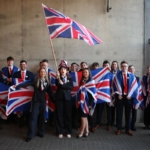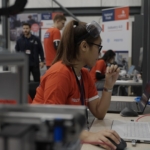Last week we published a ground-breaking report on diversity and inclusion in WorldSkills UK’s work, Championing difference for a better workforce. We commissioned the report because we know we aren’t as diverse as we want to be – or could be – in our work with young people. We didn’t want to shy away from that fact: we want to better understand why and then do something about it. By taking positive action we want to make sure our skills competitions are open to all young people, whatever their background, and learn lessons about promoting inclusion with our partners across the whole skills system.
Diversity is important to us for three main reasons. Firstly, as a charity, WorldSkills UK exists to help millions of young people through our careers advice and skills competitions, so it is our duty to make sure we can be as inclusive as possible. Then there is also an important economic case for greater diversity. If we can broaden the pool of young people who are well prepared for working life, we can help give our employer partners more choice when recruiting and help create higher performing workplaces. And, finally, as the UK’s representative in the international WorldSkills movement, we have a duty to send a team of young people to international skills competitions who are truly representative of young people from across England, Scotland, Wales and Northern Ireland – and who in turn can become role models for future generations.
The Social Innovation Partnership, in their report to us, have given us plenty to think about and I have set WorldSkills UK a target of making sure that Team UK in 2025 is much more reflective of young people across the UK than it has been in recent years.
We have a five-point action plan to give us the best possible chance of getting there:
1. Working with partners to increase inclusive registrations
Registration is the entry point to our skills competition and therefore our priority is to work with all of our various partners who help us promote our skills competitions to young people to make sure we are casting the net as widely as possible and not unintentionally excluding particular groups. This means working with colleges, training providers, universities and employers to make sure the competitors they are putting forward are diverse and working with our competition organising partners to set inclusion targets that are specific to each skill area.
2. Taking positive action to address longstanding challenges
In working with our partners, we will also help put in place concrete actions to tackle long standing challenges, such as increasing the number of young women in engineering and construction and the number of young people who are BAME and LGBT across all skills, alongside more young women and men from socially disadvantaged areas. This is not about positive discrimination – this is about addressing together some well-recognised and ingrained challenges. It is about being explicit. It is about widening raising the bar and widening the gate – because achieving higher standards in technical education, boosting meritocracy and achieving inclusion are not mutually exclusive.
3. Encouraging more role modelling to boost confidence
The research confirmed how important it is to have representative role models to make our competitions feel inclusive for all young people. We will be doing more than ever to showcase our national and international champions, to help challenge stereotypes and show young people from different backgrounds that they can start to build successful careers, whoever you are and wherever you are from. Our new Diversity and Inclusion Hero Awards are a vital platform for us to celebrate diversity among our partners – and these will be bigger and better at WorldSkills UK LIVE 2020. We will work with competition partners to seek judges and assessors from diverse backgrounds to create another important set of professional role models.
4. Addressing regional cold spots to increase uptake from diverse populations
The research confirmed to us that we have regional cold spots – specific areas of the country from where we get very few competitors but where diversity potential is potentially huge. The report particularly identified a lack of competitors from London. This means that we are missing out on a potentially very diverse cohort of students and apprentices and they are missing out on an opportunity to boost their careers. As a result, we will be increasing our focus in London and , for example, we have already planned a number of events to take place in London both at City Hall hosted by the Mayor of London and at the College of Haringay, Enfield and North West London. We will also be working with partners across the Midlands and north of England to target specific cold spots with diverse populations.
5. Reviewing our marketing images so young people can see we want them to get involved
The research highlighted that our marketing is a key tool for helping send the right message about our intent and for young people to be able to see themselves in our activities. After all: “you can’t be what you can’t see”. We will use more diverse role models in how we promote our work. We have set a target of having a fifth of the images we use to be of young people from diverse backgrounds. We will also ask our alumni network of former competitors to review our collateral we use to make sure that it appeals to young people from a range of backgrounds. And we will undertake a gender review of the language and phrases we use to promote our work to make sure how we talk about what we do is not acting as an unintended barrier to entry.
These are our priority actions for 2020, but by no means an exhaustive list. We all at WorldSkills UK -from the boardroom down – are totally committed to addressing these challenges and help make our work more inclusive for more young people. We want to help as many young people as possible get the best start in work and life – and these are key first steps on that road to a more inclusive approach.
If you have any further ideas for what we can do, or would like to work with us on this actions plan, please do get in touch. We’d love to hear from you.


